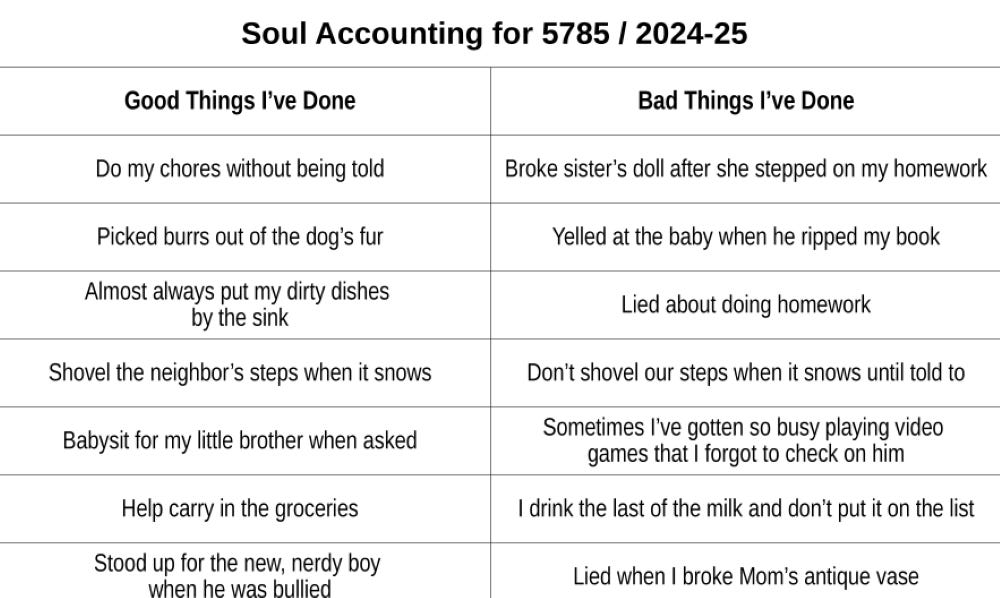Elul Calls for Action
For kids 12-14: Accounting for our sins and asking forgiveness is the work for the month before the Jewish New Year.
It is the month of Elul, the month before the Jewish New Year and Day of Atonement, Rosh Hashana and Yom Kippur. This month is special: it is the time Jews do a cheshbon ha-nefesh, an accounting of one’s soul, and then ask forgiveness from the people we’ve wronged.
A cheshbon is a bill. At a restaurant, when you’ve finished eating, the server brings the חשבון. It lists everything you ordered, the price, tax, and final amount you owe (usually not including a tip). When you pay, you receive a קבלה, a receipt that shows how much you paid.
How do these words apply to your soul?
The cheshbon is a list of the good and bad things you did during the last year. Some people write this list down. For others, it’s a list that they keep in their heads.
But I don’t like thinking about what I’ve done wrong.
When we do things we know we shouldn’t, sometimes we feel great: I showed him! Or Now she knows how she made me feel! Or even Serves him right!
But later, we often feel bad.
I shouldn’t have done that!
I wish I hadn’t gotten so angry!
I wish I hadn’t hurt her.
Now I have an enemy. That wasn’t what I wanted.
I shouldn’t have lied about that. When Dad found out I lied, he was madder than if I had just told him I messed up.
Things we should have done but didn’t also can make us feel bad:
I should have sent a thank-you email to Grandma and Grandpa for my birthday gift.
After I ruined the sweater I borrowed from my friend, Mom paid for it. But I should have told my friend I was sorry.
When we do a cheshbon ha-nefesh we think about those things we did, the things we wish we hadn’t done, and the things we didn’t do but wish we had. Then… (drum roll)
...because we admitted to ourselves (and to God) what we did wrong, we can plan to do better in the future. The truth is, until we admit we make mistakes, and think about what those mistakes were, we can’t really change.
Many of our mistakes are habits: Getting angry when Dad tells you how to do something. Leaving your underwear on the bedroom floor. Continuing to read, text your friend, or play a video game after your mother calls you to help her, which makes her mad at you so you speak to her disrespectfully. “Identifying and understanding your bad habits is the first step toward positive change,” according to How to Stop Bad Habits, an article from powerofpositivity.com.i Cheshbon ha-nefesh is the ancient Jewish way of doing something that’s become popular in today’s culture.
What do I do after I remember stuff I did wrong?
First, the Jewish thing to do is speak directly to the person involved and tell them you’re sorry. Ask them to forgive you. But an apology isn’t just about you. “[An apology] is about the person you hurt. You don’t apologize just to absolve yourself from guilt, but to acknowledge that you are the cause of someone else’s pain, and to take responsibility for your role in that.”ii Judaism teaches that God will not forgive you on Yom Kippur until you’ve said you’re sorry and have asked forgiveness from the person you wronged. And you have to really mean it—God can tell, and the person you speak to usually can, too.
This can feel weird to you, especially if you did the wrong thing months ago. In fact, the longer you go without saying “I’m sorry,” the harder those two magic words are. But Elul gives us an excuse. You can say, “Before Yom Kippur I’ve been thinking of mistakes I’ve made and stupid things I’ve done. I remember that I xxx. I’m really sorry that I hurt you. Please forgive me.”
If the person you hurt isn’t Jewish, you can say something like, “Before our holy Day of Atonement next month it’s a Jewish custom to apologize to people we’ve wronged, and ask them to forgive us. You might have forgotten, but I xxx. It’s been bothering me since I did it and it might still be bothering you. I realized that until I tell you I’m sorry, it will continue to bother me. I really am sorry, it was a dumb/hurtful/stupid thing to do. I know I hurt you, and I’m sorry. I shouldn’t have done it. Please forgive me.”
Besides apologizing, promise yourself that you will learn from what you did wrong so that you do not repeat it. A wise person once said that the real mistake is not learning from your mistakes.

What if they don’t accept my apology?
Judaism teaches that we are only in control of our own behaviors. By apologizing you are doing your part to correct the situation. If they don’t accept your apology, go back to them again in a few days and ask again. Ask a third time if they still don’t accept the apology. If they refuse to accept a third sincere apology, the weight of the sin transfers to them, because it’s wrong to hold a grudge after someone sincerely says they’re sorry.
What if I didn’t do what they think I did?
What matters is how the person felt about the situation, not what you actually did or meant to do. This means that sometimes we have to apologize for things we didn’t do, or things that were misunderstood.
Before I moved to Israel I owned a sewing school and fixed clothing for people. Once someone told me something. They wanted sympathy,iii but I responded as a tailoring professional. While from my perspective this was the right way to respond, he and his wife took it as an insult. I had a very, very difficult relationship with them until I learned why they were so upset with me. Then I explained why I had said what I did and assured them that I absolutely did not mean to call him a slob. I took full responsibility for the misunderstanding, and said that this situation taught me to be more careful in how I spoke because I didn’t want to insult anyone else. At last he and his wife forgave me.
Before I learned the Jewish attitude towards apologies and forgiveness, I would not have taken responsibility for something I didn’t mean to do. All it cost me was a little embarrassment, but it removed a burden from the couple I had accidentally insulted. I knew then that this is an important part of apologizing and being forgiven.
So, what should I do now?
During the weeks before Yom Kippur, do your own cheshbon ha-nefesh, counting your sins and the hurts and wrongs you did to other people (and to God). Apologize for your actions. Admit to them that you hurt them, and that you’re sorry about that. Ask them to forgive you.
If they don’t forgive, ask them two more times—gently and kindly. If they still don’t accept the apology, the sin becomes their problem. Judaism teaches that after three attempts to apologize, a sin transfers to the person who won’t forgive. God accepts your apology.
It’s also a great idea to make a new habit. Start doing something new and positive. Choose something small that you can actually do every day or every week, not a huge, vague plan like “work for world peace.” Some suggestions:
Send your grandparents an email or FaceTime them once a week.
Read something from the Book of Psalms every day. English (or any other language, if you don’t read Hebrew) is fine.
Psalm 119 has 8 sentences for each letter of the Hebrew alphabet. You could choose a different letter each day and say the 8 sentences for it.
Say the psalm for the year of your next birthday. If you are 14 years old, read Psalm 15 every day.
Put your dirty laundry in the hamper and clean clothes back in the closet or drawer every night.
If you bring dishes into your room for snacks, take them back to the kitchen every night, rinse them out, and if the dishwasher has dirty dishes in it, add yours. (Careful—don’t put dirty dishes in a dishwasher of clean ones!!)
And remember: besides sins against other people, your cheshbon ha-nefesh should include sins against God: things you did wrong that didn’t hurt other people, but that broke God’s commandments. Ask God to forgive you for them, and try hard not to do the same things again.
i How To Stop Bad Habits: 12 Proven Strategies for Lasting Change, Nov. 10, 2024, https://www.powerofpositivity.com/stop-bad-habits/,
ii Moss, Rabbi A., “My Wife Won’t Speak to Me!” Chabad.org, https://www.chabad.org/library/article_cdo/aid/3469546/jewish/My-Wife-Wont-Speak-to-Me.htm
iii When the man mentioned that he didn’t get repeat business, I interpreted it as a question about why. He had recently lost a lot of weight and had not had his clothes altered to fit his new shape. Because my business was fixing clothes that didn’t fit, I noticed this and thought people coming to his business might wonder if he were as careless professionally as his ill-fitting clothes suggested. So I recommended he have his pants shortened and taken in to fit better. He really had not meant to ask for help, he wanted commiseration and was insulted that I thought he looked like a slob.




Wonderful and easy to understand. Simplified how to apologize in an appropriate manner.